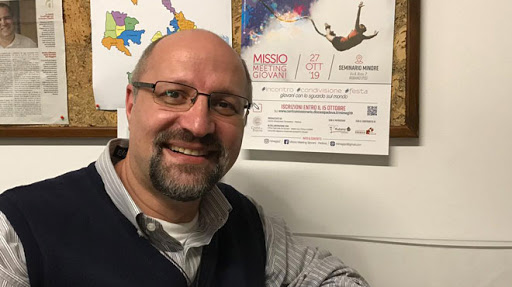
It may appear to occasion a “minor change “, yet in many ways “it changes everything.” In Latin America and especially in Brazil, Pope Francis’ recent landmark Apostolic Letter issued motu proprio Antiquum Ministerium, instituting the ministry of catechist, has been received with this twofold sentiment. Indeed,
the Church of Brazil is one in which catechists have an established role and are “recognised authorities.”
This is true, above all but not exclusively, in the Amazon rainforest areas, where the scarcity of priests is made up for by lay faithful acting as guiding lights for the communities (although distinction must be made between catechist, minister of the Word and community leader). Thus, in some respects, the Pope’s Motu Proprio is a confirmation of a pre-existing reality. Moreover, the formal institution of the ministry of catechist is an important step, a recognition that is above all a gift, but it is also a responsibility.
The “gift” of the Pope. This was precisely the sentiment with which the document of Francis was received by dom Mário Antônio da Silva, bishop of Roraima and second Vice-President of the National Conference of Bishops of Brazil (CNBB). SIR has chosen this Amazon diocese, the northernmost in Brazil, to reflect on the Holy Father’s recent decision.
 “I express my gratitude to Pope Francis for having sensitively instituted this ministry directed at persons who dedicate themselves to the work of evangelization with gratuitousness, simplicity and wisdom,” said Dom da Silva. For the Brazilian Church, for our diocese of Roraima, and also for our ‘Querida Amazonia’, the institution of the ministry of catechist
“I express my gratitude to Pope Francis for having sensitively instituted this ministry directed at persons who dedicate themselves to the work of evangelization with gratuitousness, simplicity and wisdom,” said Dom da Silva. For the Brazilian Church, for our diocese of Roraima, and also for our ‘Querida Amazonia’, the institution of the ministry of catechist
is indeed a precious gift that attests to the tireless dedication to the exercise of catechesis of so many people, men and women.
It also constitutes official recognition with respect to the working of the Holy Spirit, operating through gifts and charisms. I for my part consider it to be a recognition of the vibrant awareness that our catechists have of their commitment to this mission in our communities.”
The bishop said: “The catechist provides a vocational service. It has been a reality in Brazil for many years, in fact we have been pursuing an evangelising and vocation-oriented catechesis since the 1980s. The document attests to the reality we are experiencing in our communities with our dedicated catechists.” With regard to the practical implementation of the Motu Proprio, “through the CNBB, the Brazilian Church can contribute with studies, documents, sharing of experiences. Numerous courses and materials are available, with focus recently placed on Christian initiation.
We continue being missionary disciples, in the journey of truth and life”.
A breath of fresh air. From Boa Vista, the capital of Roraima, comes the testimony of a catechist, Gisela Rossetti, among the Catechesis coordinators in the diocese: “We welcome this document and this announcement with much joy and hope,” she said. “We consider it necessary, as a recognition. Indeed, other documents to this effect have been issued by the Brazilian Church, the most recent being last year’s Directory on Catechesis. These documents value the presence of catechists in the evangelising mission of the Church.
This formal recognition is very important, and it is only appropriate to reiterate that this option is inherently linked to the Second Vatican Council and the prospect of the vocation of so many men and women who dedicate themselves to catechesis.
I feel and believe that the institution of the ministry is a form of greater commitment. It confers worth on us and helps us, but at the same time it is a commitment, starting with formation, which must be carried out with consistency and responsibility. The document refers to a life of prayer, study and active participation in the life of the community. I am therefore confident that this recognition will help us plan effective and carefully prepared formation, with catechists working in our communities, as well as helping us in the process of discernment. This document offers us renewed impetus, it is like a breath of fresh air.”
Mission embraced as a vocation. Don Lucio Nicoletto, fidei donum missionary from the diocese of Padua and vicar general of the diocese of Roraima, explained in greater detail the novelties of the Vatican recognition. “From a practical point of view, it doesn’t change much, the Pope has given his blessing to a pastoral project that has been in place in Brazil for many years.
The figure of the catechist has consistently been highly regarded in our communities – those that chosen the model of basic ecclesial communities and others.
It can be said that the catechist has always been a hybrid figure that brings together the various pastoral and ecclesial dimensions, especially in the Latin American Church.”
 The figure of the catechist “is recognised not only in terms of actual presence, he/she are also recognised in their affective capacity due to personal closeness, a closeness that is certainly greater than that of the priest, whose presence here is unfortunately limited by the fact that he has to celebrate in so many places, and experiences the frustration of facing very fragmented responses. By contrast, the catechist acts as a bridge, connecting the priest and the community, and thus acts as a guiding light for the entire community.
The figure of the catechist “is recognised not only in terms of actual presence, he/she are also recognised in their affective capacity due to personal closeness, a closeness that is certainly greater than that of the priest, whose presence here is unfortunately limited by the fact that he has to celebrate in so many places, and experiences the frustration of facing very fragmented responses. By contrast, the catechist acts as a bridge, connecting the priest and the community, and thus acts as a guiding light for the entire community.
That is what the community needs, the journey of faith inevitably passes through human mediation, and therefore the catechist- frequently the woman catechist – becomes an integral part of the spiritual journey of each person.
For this reason, in many cases, many priests allow the possibility of choosing a male or female catechist as godfather and godmother for baptism and confirmation.”
In any event, according to Fr Nicoletto, “the institution of the new ministry recognises that before anything else the celebrated faith is the fruit of practised pedagogy, of a daily experience requiring accompaniment, and this journey cannot be undertaken as a casual service, it must be the fruit of a mission assumed as a vocation by those who live it out, in full appreciation of the living words of St Paul VI: ‘modern man listens more willingly to witnesses than to teachers.’
The fact that the Church recognises as fundamental the contribution a person can offer to the brothers and sisters of a community, mainly through his or her humanity,
imbued with their love for Christ and for their brothers and sisters, through this specific service now recognised as a specific ministry, is a precious gift.”
A female presence in most cases. The missionary pointed out: “It should be remembered that biblical reflection in Latin America has led to the acknowledgement that a patriarchal society is distinct from patriarchs and matriarchs, who are also present in societies that are not necessarily patriarchal or matriarchal in the strict sense of the term. The matriarch is someone recognised as a guiding figure, in this case for educating in the faith, for transmitting the faith.
This document further values women in the life of the Church. It contains a very strong element that enhances this missionary dimension.”
(*) journalist, “La vita del popolo”









